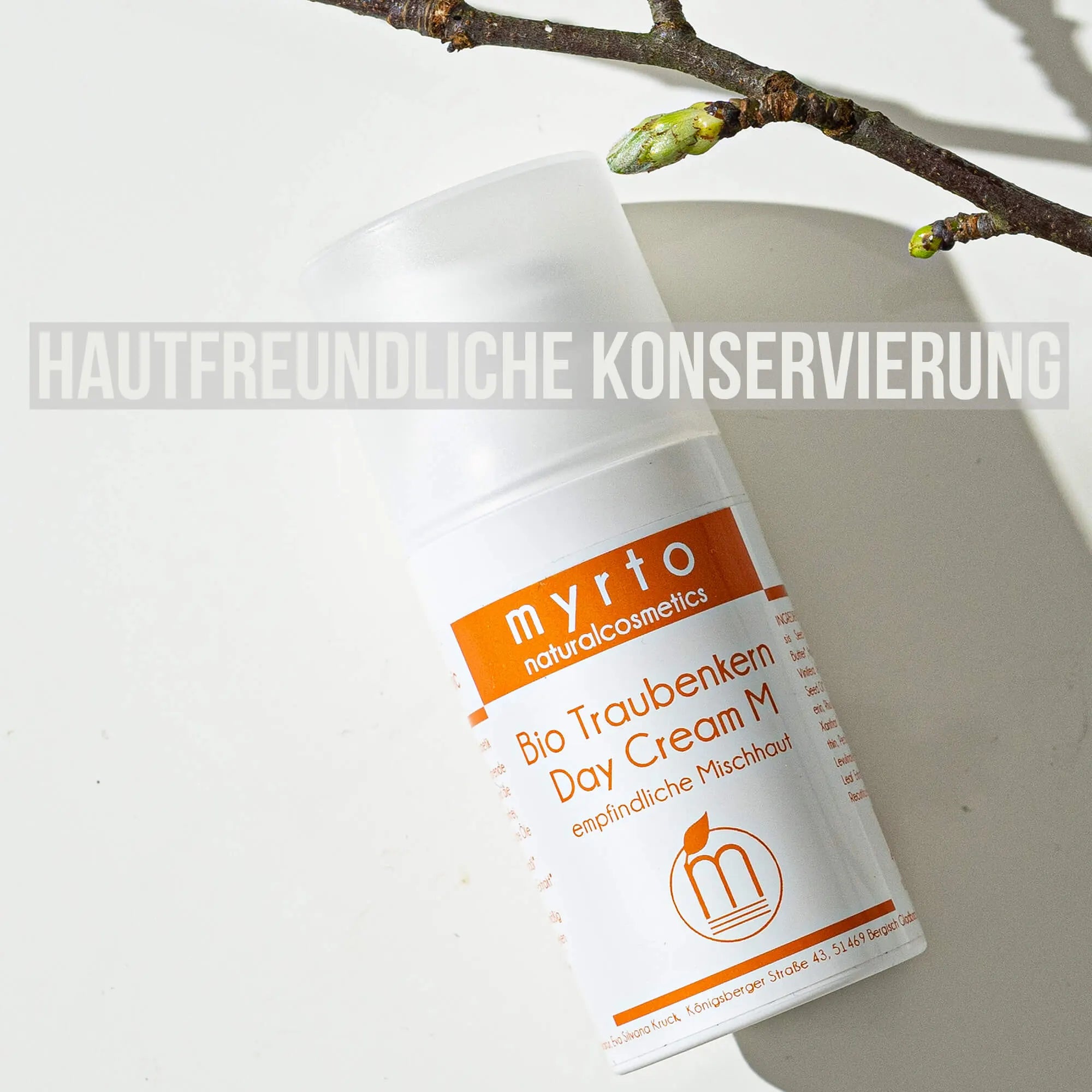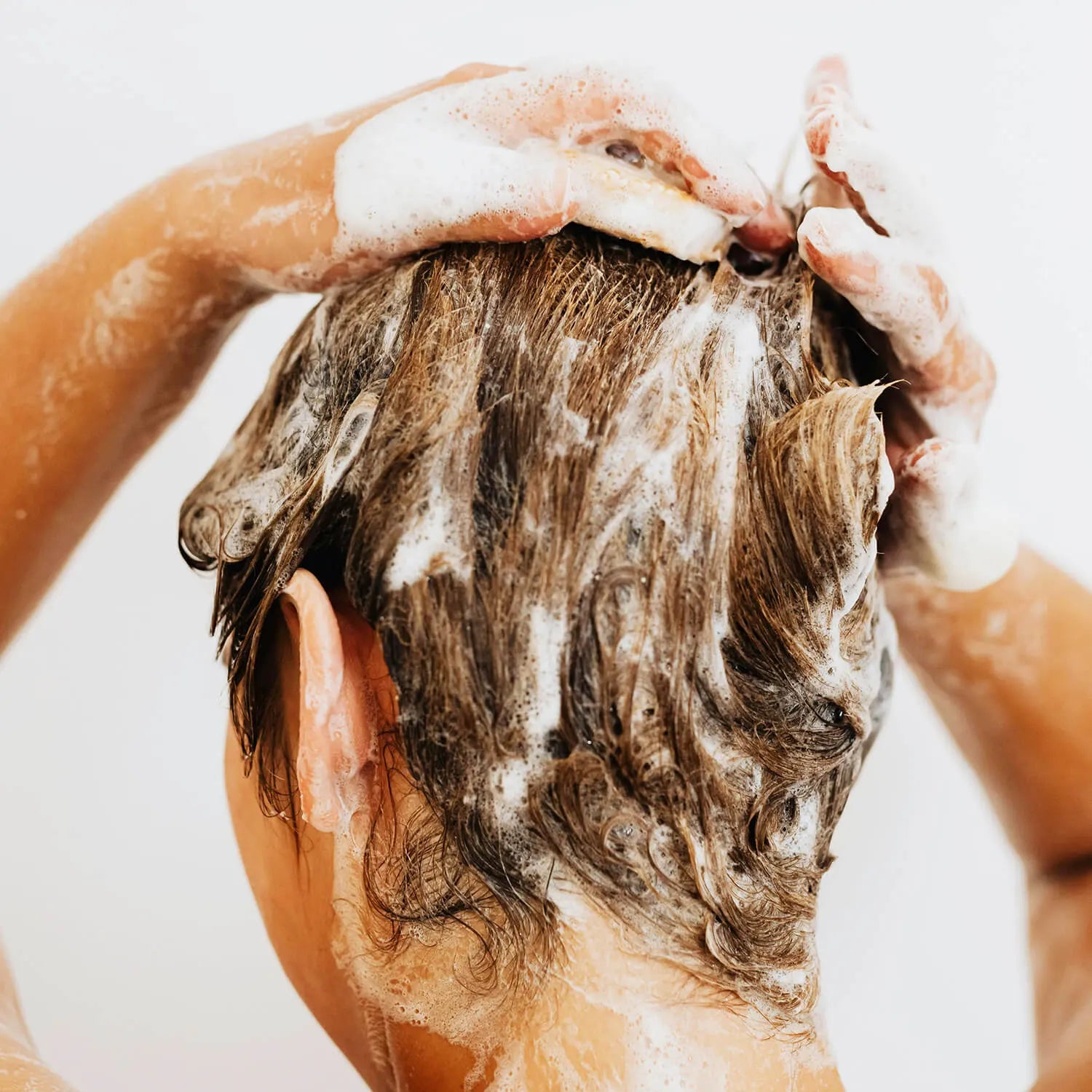
How gentle plant-based preservation protects & cares for your skin
Preservatives play an important role in cosmetics to prevent the breakdown of active ingredients and to extend the shelf life of products. Products with a high water content are particularly susceptible to the proliferation of microorganisms such as bacteria, yeasts or molds. Nevertheless, many preservatives are controversial due to their potentially negative effects on the skin and the body. They can cause skin irritation, allergies and hormonal disorders and affect sensitive metabolic processes. Therefore, the rule for preservation in cosmetics is: "As much preservation as necessary, but as little as possible".
In this article, you will learn which preservatives are problematic, which skin-friendly alternatives there are that do not irritate even sensitive skin, and what role packaging plays in the shelf life of cosmetics.
Problematic preservatives
-
parabens
Parabens are widely used preservatives that have been used in cosmetics for over 80 years to inhibit the growth of germs. They are permitted in small concentrations in cosmetics according to EU regulations, but their hormonal effects have long been criticized. Parabens are similar in structure to the female sex hormone estrogen and can disrupt hormonal balance, causing health problems such as breast cancer and reduced fertility. Studies show that parabens lower testosterone levels in men, which leads to feminization and impairs sperm production. Parabens can also cause increased allergic reactions and act as contact allergens. Studies also show that children of women who used cosmetics containing parabens during pregnancy have an increased risk of severe obesity.
Nevertheless, the Federal Institute for Risk Assessment (BfR) considers the use of methyl and ethyl paraben in the permitted concentration range up to 0.4% in cosmetics to be safe. Other parabens such as butyl or propyl paraben with an even stronger estrogenic effect are considered safe up to a use of 0.19%, but are strictly prohibited, at least in baby products. Parabens are generally not permitted in natural cosmetics.
Parabens are not only found in cosmetics, but also in food and pharmaceutical products. The problem is not so much their presence in a single product in low concentrations, but rather the critical total amount of parabens to which we are exposed over the course of our lives and which accumulate in our bodies.
In addition to parabens, other preservatives such as formaldehyde, formaldehyde releasers and halogenated organic compounds are suspected of being carcinogenic and causing allergies. -
phenoxyethanol
Phenoxyethanol is a commonly used preservative that can also cause skin irritation. In addition, the pleasant-smelling substance is considered to be potentially allergenic and therefore, according to the EU Cosmetics Regulation, may not be contained in skin care products in quantities exceeding 1%. Phenoxyethanol is also suspected of impairing the immune system. In some countries, such as France, its use in baby products is restricted. -
"Nature-identical" preservatives
Preservatives such as potassium sorbate, benzoic acid, sorbic acid or sodium benzoate, which are approved for use in certified natural cosmetics, also pose an increased risk of skin irritation and can trigger allergies. These preservatives, which are declared to be "nature-identical", are also used in processed foods. They are suspected of impairing sensitive metabolic processes in the body and promoting complaints such as irritable bowel syndrome. -
alcohol
Traditionally, natural cosmetics are often preserved with pure alcohol in concentrations over 15%. Alcohol (INCI: Alcohol) is not considered a preservative according to the EU Cosmetics Regulation, but it effectively combats bacteria, molds and yeasts. Alcohol is not sensitizing, but it degreases the skin and weakens the skin barrier.
Innovative skin-friendly preservation without chemicals
Innovative natural cosmetics rely on skin-friendly alternatives that enable gentle preservation without aggressive chemicals. Our concept for natural preservation is therefore free of conventional preservatives.
-
Organic acids
Our innovative approach to preservation relies on multifunctional plant-based ingredients that combine antimicrobial effects with caring properties. These include, for example, organic acids such as anisic acid and levulinic acid from star anise and Indian basil, which not only improve the skin's natural acid protection, but are also effective against bacteria, fungi and yeasts. Since these acids are not considered preservatives according to the EU Cosmetics Regulation, corresponding products can be declared as "preservative-free". -
Pentylene Glycol
Pentylene Glycol, another multifunctional ingredient, is extracted from sugar cane and corn and has a moisturizing and antimicrobial effect. It also promotes the absorption of active ingredients into deeper layers of the skin and is particularly skin-friendly as it does not clog pores. Pentylene Glycol is more expensive than conventional preservatives, but is used in high-quality natural cosmetic products due to its many benefits.
Other natural preservation methods
-
Oxidation-stabilizing vegetable oils
We use a high proportion of oxidation-stable oils such as shea butter or jojoba oil, which prevent the oxidation of other ingredients and strengthen the skin barrier. Essential oils such as tea tree or lavender oil as well as some plant extracts also have natural antimicrobial properties that extend the shelf life of products. -
antioxidants
Antioxidants such as vitamins A, C and E protect the skin from oxidative stress, which can lead to premature skin aging. Not only do they firm and smooth the skin, they also prevent oils and fats in skin care products from going rancid.
Shelf life & packaging
Cosmetic products usually have a shelf life of at least 30 months when unopened. However, our fresh cosmetics have a shorter shelf life because we do not use aggressive preservatives in order to achieve the best possible skin compatibility.
In addition to the ingredients, the packaging also plays a role in the shelf life of skin care. Products in jars are more susceptible to contamination due to frequent contact with fingers. It is therefore advisable to remove them with a clean spatula. Airless dispensers are best suited to minimise contamination by germs from the outside. The vacuum system allows the need for preservatives to be significantly reduced, which benefits skin tolerance.
protection from heat, moisture & sunlight
To ensure that your products stay fresh for a long time after opening, you should store them in a cool, dark place, protected from sunlight and moisture. This does not have to be in the refrigerator - normal room temperature and not too high humidity are sufficient. In general, you should only open your cosmetics containers for as short a time as necessary so that the product does not come into unnecessary contact with oxidizing oxygen or contaminants can get into the container. Make sure to protect the products from direct sunlight - even if most of our products are already packaged in light-protected brown glass bottles. This way, your cosmetics will stay fresh until the last drop and give your skin all the benefits for a vital and healthy appearance.
Conclusion
While conventional preservatives such as parabens, phenoxyethanol, potassium sorbate or sodium benzoate are associated with skin irritation and health risks, we rely on skin-friendly alternatives. Organic acids and pentylene glycol from sugar cane offer gentle preservation with an additional long-lasting skin-care effect. This innovative approach enables purely plant-based cosmetic preservation without chemicals, which is both effective and optimally tolerated - especially for sensitive and allergy-prone skin.



